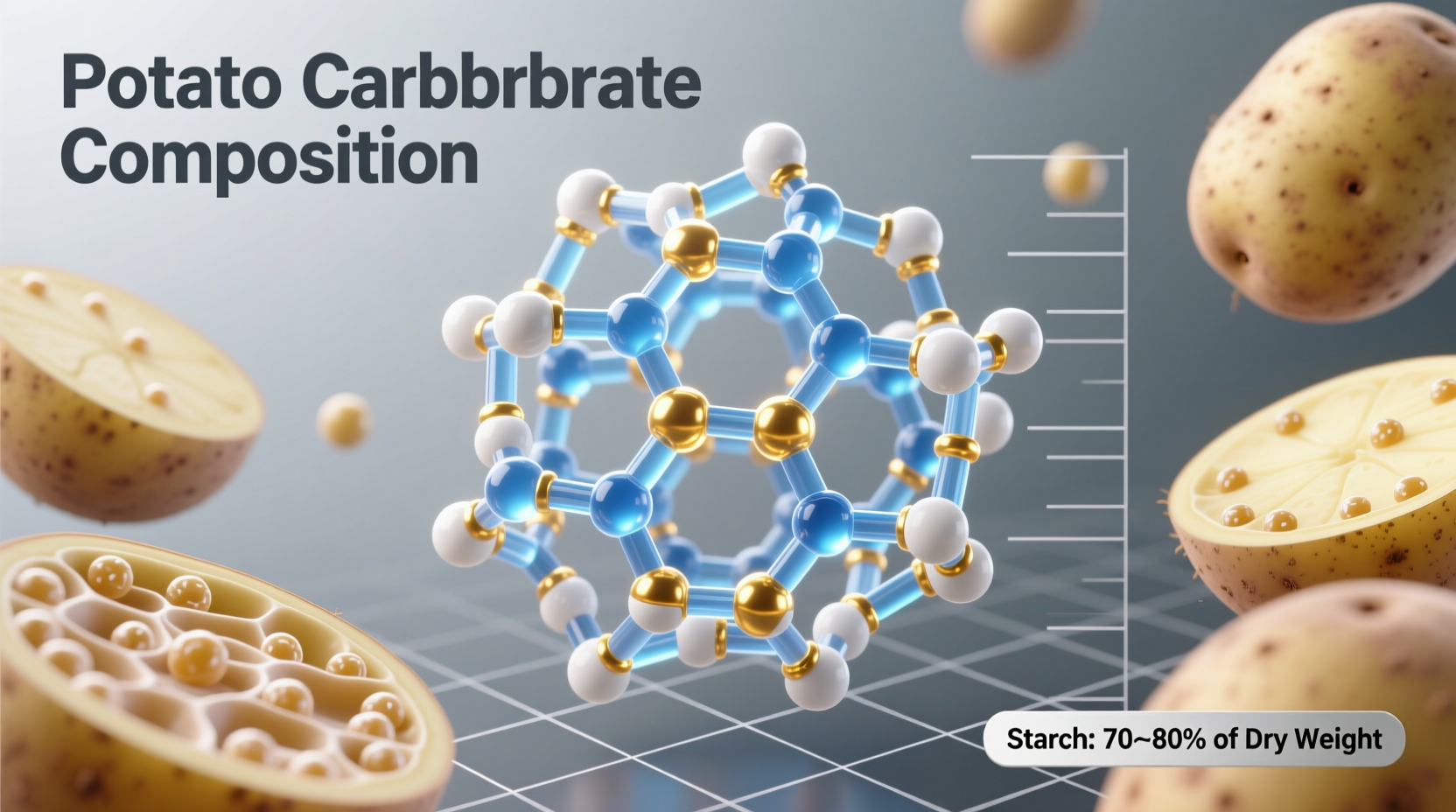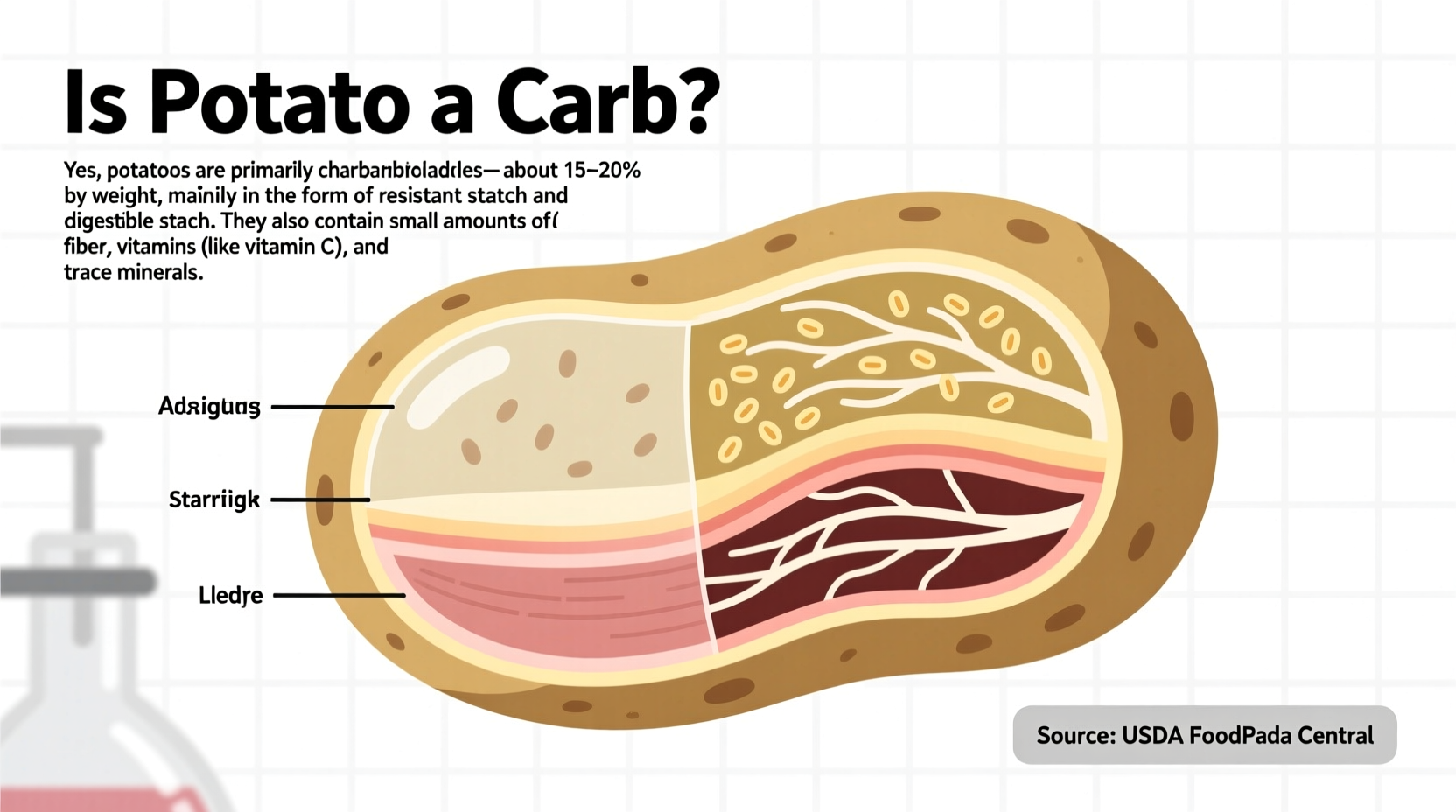Understanding whether potatoes qualify as carbohydrates matters for anyone managing their diet, whether for weight control, blood sugar management, or athletic performance. This comprehensive guide breaks down the nutritional reality of potatoes, explains their carb composition, and provides practical guidance for incorporating them into various eating patterns.
What Exactly Are Carbohydrates?
Carbohydrates represent one of three essential macronutrients, alongside proteins and fats. They serve as your body's primary energy source, breaking down into glucose that fuels your brain, muscles, and organs. Carbs fall into three main categories:
- Simple carbohydrates: Found in sugars (fructose, glucose, sucrose) that provide quick energy
- Complex carbohydrates: Starches and fiber that digest more slowly, providing sustained energy
- Dietary fiber: Indigestible plant material that supports digestive health
Potatoes primarily contain complex carbohydrates in the form of starch, along with valuable dietary fiber.
Potato Nutritional Profile: Beyond Just Carbs
While carbohydrates dominate potato nutrition, these versatile tubers offer much more. The USDA National Nutrient Database provides this detailed breakdown for a medium (150g) boiled potato with skin:
| Nutrient | Amount | % Daily Value |
|---|---|---|
| Total Carbohydrates | 26g | 9% |
| Dietary Fiber | 2.5g | 9% |
| Sugars | 1.7g | - |
| Protein | 2.5g | 5% |
| Vitamin C | 17mg | 19% |
| Potassium | 535mg | 15% |
| Vitamin B6 | 0.3mg | 15% |
Notice that while carbs constitute the majority of potato nutrition, they also deliver significant potassium and vitamin C—more than you'd find in an equivalent serving of many fruits.
Types of Carbohydrates in Potatoes
Not all carbs function the same way in your body. Potatoes contain three distinct carbohydrate components:
- Starch (20-25g per medium potato): The primary carb form, consisting of long glucose chains that break down during digestion
- Dietary Fiber (2-3g): Found mainly in the skin, supporting gut health and slowing glucose absorption
- Natural Sugars (1-2g): Simple carbohydrates like glucose and sucrose that provide immediate energy
The combination of starch and fiber makes potatoes a source of complex carbohydrates, which generally provide more sustained energy than simple sugars alone.

How Potato Varieties Compare Nutritionally
Different potato types contain varying carb levels. This comparison from the USDA FoodData Central shows how common varieties stack up:
| Potato Variety | Carbs per 100g | Fiber per 100g | Glycemic Index |
|---|---|---|---|
| Russet | 17g | 1.3g | 85 |
| Red Bliss | 15g | 2.0g | 75 |
| Sweet Potato | 20g | 3.0g | 63 |
| Yukon Gold | 16g | 1.8g | 78 |
Notice that red potatoes and sweet potatoes generally have lower glycemic indexes than russets, meaning they cause smaller blood sugar spikes. The higher fiber content in red potatoes contributes to this more favorable glycemic response.
How Cooking Methods Affect Carb Availability
Your preparation method significantly impacts how your body processes potato carbohydrates. Research from the American Journal of Clinical Nutrition shows that:
- Cooling cooked potatoes increases resistant starch by up to 50%, reducing the glycemic impact
- Baking preserves more nutrients than boiling, which leaches some vitamins into water
- Frying dramatically increases calorie density while adding unhealthy fats
- Leaving skins on boosts fiber content by 25-30%
For optimal nutritional benefit, try boiling potatoes with skin intact, then cooling them before eating in salads. This preparation maximizes resistant starch formation while preserving nutrients.
Practical Guidance for Different Dietary Approaches
Whether potatoes fit your diet depends on your specific nutritional goals:
For Weight Management
Studies published in Nutrition Journal show potatoes can support weight loss when prepared healthily. Their high satiety index (over 300% of white bread) means they keep you feeling full longer, potentially reducing overall calorie intake.
For Blood Sugar Control
People managing diabetes should consider portion sizes and preparation methods. Pairing potatoes with protein and healthy fats slows glucose absorption. The American Diabetes Association recommends limiting portions to 1/2 cup cooked and choosing lower-GI varieties like red potatoes.
For Low-Carb and Keto Diets
Traditional ketogenic diets restrict carbs to 20-50g daily, making standard potato portions incompatible. However, some modified low-carb approaches might include small portions of cooled potatoes for their resistant starch benefits. Sweet potatoes generally fit better into moderate low-carb plans due to their higher fiber and nutrient density.
Common Misconceptions About Potatoes and Carbs
Several myths persist about potatoes in modern nutrition discourse:
- "Potatoes are just empty carbs": False—they provide potassium, vitamin C, and fiber
- "All potatoes spike blood sugar equally": False—preparation and variety significantly impact glycemic response
- "Sweet potatoes are always healthier": Not necessarily—they contain more total carbs but offer additional beta-carotene
- "Potato skins contain all the nutrients": Partially true—skins contain significant fiber, but nutrients distribute throughout the potato
Understanding these nuances helps you make informed choices rather than following oversimplified dietary advice.
Smart Ways to Enjoy Potatoes in a Balanced Diet
Instead of eliminating potatoes entirely, consider these evidence-based strategies:
- Choose smaller portions (1/2 medium potato) as part of balanced meals
- Pair with protein sources like chicken, fish, or legumes to balance blood sugar
- Add vinegar to potato salads to lower glycemic impact by up to 35%
- Opt for colorful varieties like purple potatoes, which contain additional antioxidants
- Combine with non-starchy vegetables to increase nutrient density per serving
Remember that dietary context matters more than any single food. Potatoes have sustained civilizations for centuries and can absolutely fit within a healthy, balanced eating pattern when consumed mindfully.











 浙公网安备
33010002000092号
浙公网安备
33010002000092号 浙B2-20120091-4
浙B2-20120091-4